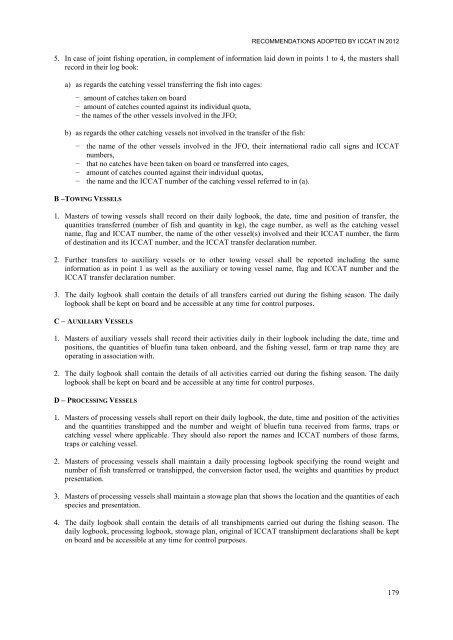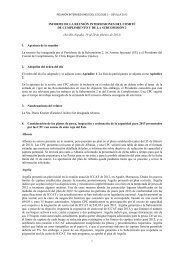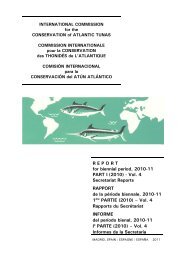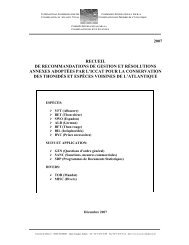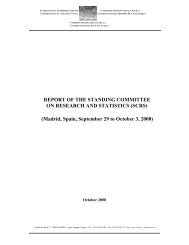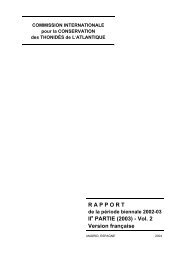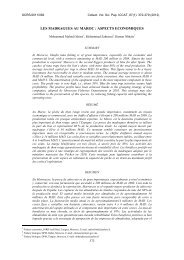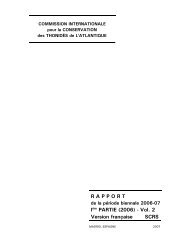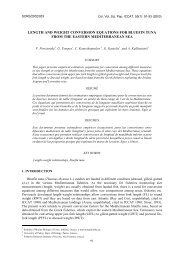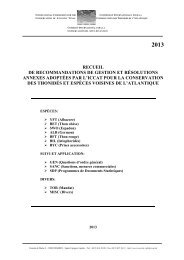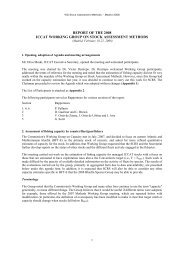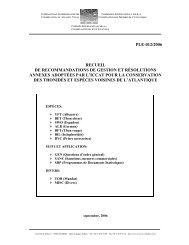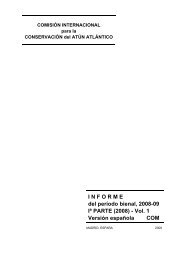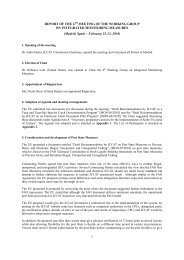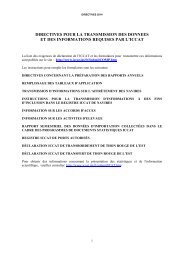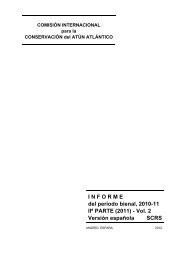- Page 1 and 2:
INTERNATIONAL COMMISSION for the CO
- Page 3 and 4:
FOREWORD The Chairman of the Intern
- Page 5 and 6:
12-08 Recommendation by ICCAT Suppl
- Page 7 and 8:
ICCAT REPORT 2012-2013 (I) European
- Page 9 and 10:
ICCAT REPORT 2012-2013 (I) Changes
- Page 11 and 12:
ICCAT REPORT 2012-2013 (I) activiti
- Page 13 and 14:
ICCAT REPORT 2012-2013 (I) Streamli
- Page 15 and 16:
ICCAT REPORT 2012-2013 (I) ANNEX 2
- Page 17 and 18:
ICCAT REPORT 2012-2013 (I) Fraser,
- Page 19 and 20:
ICCAT REPORT 2012-2013 (I) Konan, K
- Page 21 and 22:
ICCAT REPORT 2012-2013 (I) De Lambe
- Page 23 and 24:
ICCAT REPORT 2012-2013 (I) Lesueur,
- Page 25 and 26:
ICCAT REPORT 2012-2013 (I) Toro Nie
- Page 27 and 28:
ICCAT REPORT 2012-2013 (I) Elizabet
- Page 29 and 30:
ICCAT REPORT 2012-2013 (I) Ota, Shi
- Page 31 and 32:
ICCAT REPORT 2012-2013 (I) Mikail,
- Page 33 and 34:
ICCAT REPORT 2012-2013 (I) Moufquia
- Page 35 and 36:
ICCAT REPORT 2012-2013 (I) Sy, Rich
- Page 37 and 38:
ICCAT REPORT 2012-2013 (I) TUNISIA
- Page 39 and 40:
ICCAT REPORT 2012-2013 (I) Campbell
- Page 41 and 42:
ICCAT REPORT 2012-2013 (I) Dezamy,
- Page 43 and 44:
ICCAT REPORT 2012-2013 (I) COMHAFAT
- Page 45 and 46:
ICCAT REPORT 2012-2013 (I) Balfegó
- Page 47 and 48:
ICCAT REPORT 2012-2013 (I) Pages, E
- Page 49 and 50:
ICCAT REPORT 2012-2013 (I) ANNEX 3
- Page 51 and 52:
ICCAT REPORT 2012-2013 (I) I am gra
- Page 53 and 54:
ICCAT REPORT 2012-2013 (I) Brazil O
- Page 55 and 56:
ICCAT REPORT 2012-2013 (I) The Plan
- Page 57 and 58:
ICCAT REPORT 2012-2013 (I) Although
- Page 59 and 60:
ICCAT REPORT 2012-2013 (I) Uruguay
- Page 61 and 62:
ICCAT REPORT 2012-2013 (I) As part
- Page 63 and 64:
ICCAT REPORT 2012-2013 (I) Sharks I
- Page 65 and 66:
ICCAT REPORT 2012-2013 (I) overfish
- Page 67 and 68:
ICCAT REPORT 2012-2013 (I) 2) Do no
- Page 69 and 70:
ICCAT REPORT 2012-2013 (I) Referenc
- Page 71 and 72:
ICCAT REPORT 2012-2013 (I) 6.2 Trac
- Page 73 and 74:
ICCAT REPORT 2012-2013 (I) Appendix
- Page 75 and 76:
ICCAT REPORT 2012-2013 (I) Ho-Woon,
- Page 77 and 78:
ICCAT REPORT 2012-2013 (I) Dubois,
- Page 79 and 80:
ICCAT REPORT 2012-2013 (I) improvin
- Page 81 and 82:
ICCAT REPORT 2012-2013 (I) by the p
- Page 83 and 84:
ICCAT REPORT 2012-2013 (I) 34.bis T
- Page 85 and 86:
ICCAT REPORT 2012-2013 (I) 3. DESCR
- Page 87 and 88:
ICCAT REPORT 2012-2013 (I) 10. INFO
- Page 89 and 90:
ICCAT REPORT 2012-2013 (I) ICCAT Tu
- Page 91 and 92:
ICCAT REPORT 2012-2013 (I) DECLARAT
- Page 93 and 94:
ICCAT REPORT 2012-2013 (I) Annex 5
- Page 95 and 96:
ICCAT REPORT 2012-2013 (I) Designat
- Page 97 and 98:
ICCAT REPORT 2012-2013 (I) authorit
- Page 99 and 100:
ICCAT REPORT 2012-2013 (I) deemed n
- Page 101 and 102:
ICCAT REPORT 2012-2013 (I) 18. The
- Page 103 and 104:
ICCAT REPORT 2012-2013 (I) Annex 2
- Page 105 and 106:
ICCAT REPORT 2012-2013 (I) f) In li
- Page 107 and 108:
ICCAT REPORT 2012-2013 (I) Appendix
- Page 109 and 110:
ICCAT REPORT 2012-2013 (I) 4.b Ecos
- Page 111 and 112:
ICCAT REPORT 2012-2013 (I) Working
- Page 113 and 114:
ICCAT REPORT 2012-2013 (I) 1. Openi
- Page 115 and 116:
ICCAT REPORT 2012-2013 (I) Spezzani
- Page 117 and 118:
ICCAT REPORT 2012-2013 (I) TUNISIA
- Page 119 and 120:
ICCAT REPORT 2012-2013 (I) PEW ENVI
- Page 121 and 122:
ICCAT REPORT 2012-2013 (I) lodged b
- Page 123 and 124:
ICCAT REPORT 2012-2013 (I) 118 Prop
- Page 125 and 126:
ICCAT REPORT 2012-2013 (I) communic
- Page 127 and 128:
ICCAT REPORT 2012-2013 (I) The Grou
- Page 129 and 130:
ICCAT REPORT 2012-2013 (I) The 3-ye
- Page 131 and 132:
ICCAT REPORT 2012-2013 (I) 126 1) M
- Page 133 and 134: ICCAT REPORT 2012-2013 (I) Appendix
- Page 135 and 136: ICCAT REPORT 2012-2013 (I) 130 Draf
- Page 137 and 138: ICCAT REPORT 2012-2013 (I) 4 List o
- Page 139 and 140: ICCAT REPORT 2012-2013 (I) 9 Transh
- Page 141 and 142: ICCAT REPORT 2012-2013 (I) 17 Catch
- Page 143 and 144: ICCAT REPORT 2012-2013 (I) SPECIES
- Page 145 and 146: ICCAT REPORT 2012-2013 (I) SWORDFIS
- Page 147 and 148: ICCAT REPORT 2012-2013 (I) 40 Bluef
- Page 149 and 150: ICCAT REPORT 2012-2013 (I) 48 Bluef
- Page 151 and 152: ICCAT REPORT 2012-2013 (I) 60 Bluef
- Page 153 and 154: ICCAT REPORT 2012-2013 (I) Draft [R
- Page 155 and 156: ICCAT REPORT 2012-2013 (I) enhance
- Page 157 and 158: ICCAT REPORT 2012-2013 (I) ANNEX 5
- Page 159 and 160: ICCAT REPORT 2012-2013 (I) 12-02 BF
- Page 161 and 162: ICCAT REPORT 2012-2013 (I) c) Consi
- Page 163 and 164: ICCAT REPORT 2012-2013 (I) 22. Each
- Page 165 and 166: ICCAT REPORT 2012-2013 (I) 12-03 BF
- Page 167 and 168: ICCAT REPORT 2012-2013 (I) 10. Notw
- Page 169 and 170: ICCAT REPORT 2012-2013 (I) 31. For
- Page 171 and 172: ICCAT REPORT 2012-2013 (I) Part IV
- Page 173 and 174: ICCAT REPORT 2012-2013 (I) a) the q
- Page 175 and 176: ICCAT REPORT 2012-2013 (I) − name
- Page 177 and 178: ICCAT REPORT 2012-2013 (I) 87. The
- Page 179 and 180: ICCAT REPORT 2012-2013 (I) Data and
- Page 181 and 182: ICCAT REPORT 2012-2013 (I) Part VI
- Page 183: ICCAT REPORT 2012-2013 (I) Annex 2
- Page 187 and 188: ICCAT REPORT 2012-2013 (I) Catch Re
- Page 189 and 190: ICCAT REPORT 2012-2013 (I) Annex 7
- Page 191 and 192: ICCAT REPORT 2012-2013 (I) pertaini
- Page 193 and 194: ICCAT REPORT 2012-2013 (I) Illegal,
- Page 195 and 196: ICCAT REPORT 2012-2013 (I) Minimum
- Page 197 and 198: ICCAT REPORT 2012-2013 (I) Blue Mar
- Page 199 and 200: ICCAT REPORT 2012-2013 (I) 12-05 BY
- Page 201 and 202: ICCAT REPORT 2012-2013 (I) SECTION
- Page 203 and 204: ICCAT REPORT 2012-2013 (I) SECTION
- Page 205 and 206: ICCAT REPORT 2012-2013 (I) Annex 2
- Page 207 and 208: ICCAT REPORT 2012-2013 (I) f) In li
- Page 209 and 210: ICCAT REPORT 2012-2013 (I) 12-07 GE
- Page 211 and 212: ICCAT REPORT 2012-2013 (I) 12. The
- Page 213 and 214: ICCAT REPORT 2012-2013 (I) General
- Page 215 and 216: ICCAT REPORT 2012-2013 (I) 12-09 TO
- Page 217 and 218: ICCAT REPORT 2012-2013 (I) 12-10 TO
- Page 219 and 220: ICCAT REPORT 2012-2013 (I) ANNEX 6
- Page 221 and 222: ICCAT REPORT 2012-2013 (I) ANNEX 7
- Page 223 and 224: ICCAT REPORT 2012-2013 (I) Part I (
- Page 225 and 226: ICCAT REPORT 2012-2013 (I) ANNEX 8
- Page 227 and 228: ICCAT REPORT 2012-2013 (I) 7. Consi
- Page 229 and 230: ICCAT REPORT 2012-2013 (I) to impro
- Page 231 and 232: Table 2. Basic information to calcu
- Page 233 and 234: Table 4. Contributions by group 201
- Page 235 and 236:
ICCAT REPORT 2012-2013 (I) Table 2
- Page 237 and 238:
ICCAT REPORT 2012-2013 (I) Some cat
- Page 239 and 240:
ICCAT REPORT 2012-2013 (I) Request
- Page 241 and 242:
ICCAT REPORT 2012-2013 (I) Lastly,
- Page 243 and 244:
ICCAT REPORT 2012-2013 (I) 5.2.1 Ea
- Page 245 and 246:
ICCAT REPORT 2012-2013 (I) The majo
- Page 247 and 248:
ICCAT REPORT 2012-2013 (I) REPORT O
- Page 249 and 250:
ICCAT REPORT 2012-2013 (I) REPORT O
- Page 251 and 252:
ICCAT REPORT 2012-2013 (I) measure
- Page 253 and 254:
ICCAT REPORT 2012-2013 (I) The Chai
- Page 255 and 256:
ICCAT REPORT 2012-2013 (I) 7.3 SCRS
- Page 257 and 258:
ICCAT REPORT 2012-2013 (I) Appendix
- Page 259 and 260:
ICCAT REPORT 2012-2013 (I) FAD Iden
- Page 261 and 262:
ICCAT REPORT 2012-2013 (I) Commissi
- Page 263 and 264:
ICCAT REPORT 2012-2013 (I) Appendix
- Page 265 and 266:
ICCAT REPORT 2012-2013 (I) Western
- Page 267 and 268:
ICCAT REPORT 2012-2013 (I) Appendix
- Page 269 and 270:
ICCAT REPORT 2012-2013 (I) Joint St
- Page 271 and 272:
ICCAT REPORT 2012-2013 (I) The many
- Page 273 and 274:
ICCAT REPORT 2012-2013 (I) ANNEX 10
- Page 275 and 276:
ICCAT REPORT 2012-2013 (I) Committe
- Page 277 and 278:
ICCAT REPORT 2012-2013 (I) Concern
- Page 279 and 280:
ICCAT REPORT 2012-2013 (I) General
- Page 281 and 282:
ICCAT REPORT 2012-2013 (I) SOUTH AL
- Page 283 and 284:
ICCAT REPORT 2012-2013 (I) SOUTH SW
- Page 285 and 286:
ICCAT REPORT 2012-2013 (I) WEST BLU
- Page 287 and 288:
ICCAT REPORT 2012-2013 (I) WHITE MA
- Page 289 and 290:
ICCAT REPORT 2012-2013 (I) Species
- Page 291 and 292:
CPC Potential issues of non-complia
- Page 293 and 294:
CPC Potential issues of non-complia
- Page 295 and 296:
CPC Potential issues of non-complia
- Page 297 and 298:
CPC Potential issues of non-complia
- Page 299 and 300:
CPC Potential issues of noncomplian
- Page 301 and 302:
CPC Potential issues of noncomplian
- Page 303 and 304:
CPC Potential issues of non-complia
- Page 305 and 306:
CPC Potential issues of non-complia
- Page 307 and 308:
CPC 2008 2011 Potential issues of n
- Page 309 and 310:
CPC Potential issues of noncomplian
- Page 311 and 312:
CPC Potential issues of noncomplian
- Page 313 and 314:
CPC Potential issues of noncomplian
- Page 315 and 316:
CPC Potential issues of non-complia
- Page 317 and 318:
CPC Potential issues of non-complia
- Page 319 and 320:
CPC Potential issues of non-complia
- Page 321 and 322:
CPC Potential issues of noncomplian
- Page 323 and 324:
CPC Potential issues of noncomplian
- Page 325 and 326:
CPC Potential issues of non-complia
- Page 327 and 328:
CPC Potential issues of non-complia
- Page 329 and 330:
CPC Potential issues of noncomplian
- Page 331 and 332:
CPC Potential issues of noncomplian
- Page 333 and 334:
CPC Potential issues of noncomplian
- Page 335 and 336:
CPC Potential issues of noncomplian
- Page 337 and 338:
CPC Potential issues of non-complia
- Page 339 and 340:
COLOMBIA 2011 2012 Actions taken Po
- Page 341 and 342:
2012 Potential issues of non-compli
- Page 343 and 344:
ICCAT REPORT 2012-2013 (I) Appendix
- Page 345 and 346:
ICCAT REPORT 2012-2013 (I) recommen
- Page 347 and 348:
ICCAT REPORT 2012-2013 (I) The EU r
- Page 349 and 350:
ICCAT REPORT 2012-2013 (I) 2012 Lis
- Page 351 and 352:
ICCAT REPORT 2012-2013 (I) Serial n
- Page 353 and 354:
ICCAT REPORT 2012-2013 (I) Serial n
- Page 355 and 356:
ICCAT REPORT 2012-2013 (I) Appendix
- Page 357:
ICCAT REPORT 2012-2013 (I) Electron


